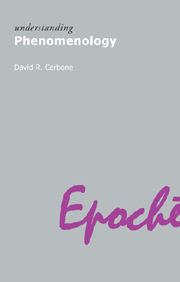Book contents
- Frontmatter
- Contents
- Acknowledgements
- Abbreviations
- Introduction: opening exercises
- 1 Husserl and the project of pure phenomenology
- 2 Heidegger and the existential turn
- 3 Sartre and subjectivity
- 4 Merleau-Ponty and the phenomenology of embodiment
- 5 Problems and prospects: phenomenology and its critics
- Questions for discussion and revision
- Further reading
- References
- Index
Questions for discussion and revision
- Frontmatter
- Contents
- Acknowledgements
- Abbreviations
- Introduction: opening exercises
- 1 Husserl and the project of pure phenomenology
- 2 Heidegger and the existential turn
- 3 Sartre and subjectivity
- 4 Merleau-Ponty and the phenomenology of embodiment
- 5 Problems and prospects: phenomenology and its critics
- Questions for discussion and revision
- Further reading
- References
- Index
Summary
The following questions are designed to facilitate discussion and may also be appropriate as paper topics.
one Husserl and the project of pure phenomenology
How and why does Husserl argue against naturalism? What is the relation between his arguments against a naturalistic conception of logic and his conception of phenomenology? Why does he think that the phenomena of phenomenology cannot be understood as natural entities, akin to material objects?
In what way(s) is phenomenology for Husserl a transcendental investigation? What kinds of questions does phenomenology consider, and why does Husserl think that the natural attitude, including the natural sciences, is unable to answer those sorts of questions?
What is the phenomenological reduction? How does it work and why does Husserl think it is necessary for phenomenology? What, according to Husserl, does the phenomenological reduction reveal?
Consider your own perceptual experience, a particular episode of visual or auditory experience, and try to describe it using Husserl's structural concepts, such as retention and protention, horizon and synthesis, noesis and noema. How might one argue that these structures are essential to your experience being what it is?
What is the eidetic reduction? How does it work? How is it different from the phenomenological reduction? Why is the eidetic reduction essential to Husserl's overall project of transcendental phenomenology?
Information
- Type
- Chapter
- Information
- Understanding Phenomenology , pp. 177 - 180Publisher: Acumen PublishingPrint publication year: 2006
